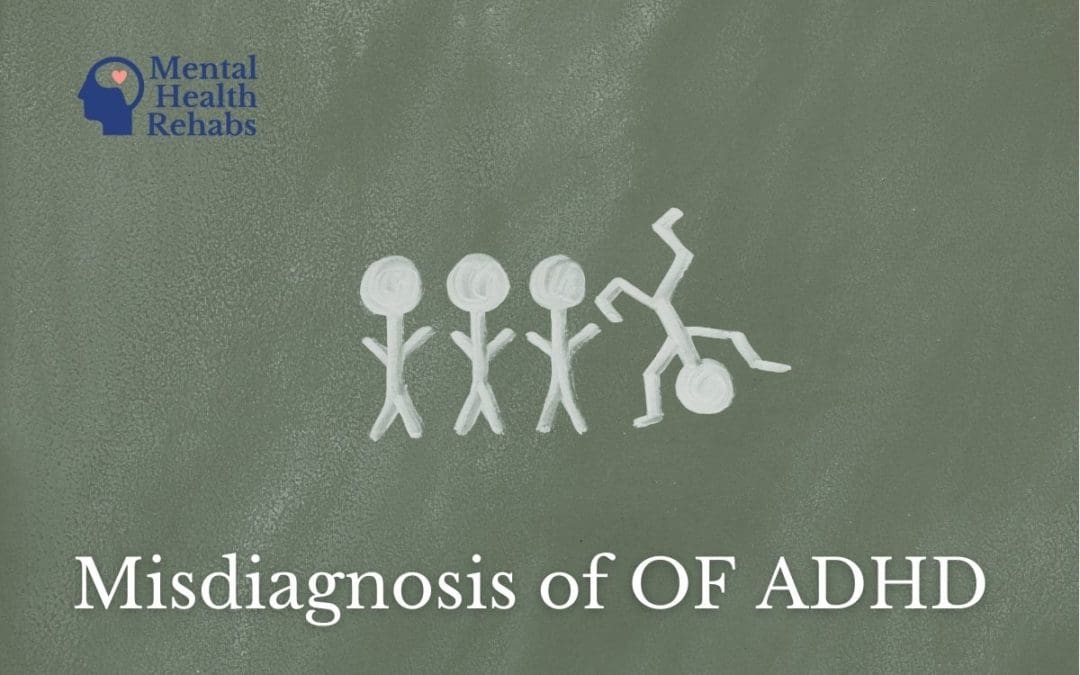Attention deficit hyperactivity disorder, better known as ADHD, is a condition that manifests itself as an inability to focus, difficulty staying organized, and poor impulse control–the results of which can have several real-world consequences like financial troubles, difficulty maintaining employment, and repeated instances of failed relationships. Such occurrences aren’t exclusive to individuals with ADHD, however.
Most adults will experience these symptoms to some degree, either on an ongoing or more acute basis, and can be caused by several conditions that mimic ADHD. It’s no coincidence that in addition to being one of the most common diagnosis disorders for children, it is also one of the most commonly misdiagnosed. The effects of misdiagnosis of ADHD can carry serious financial, social, and psychological consequences.
The Effects of Misdiagnosed ADHD
Physical Dependence
The cause of ADHD is largely attributed to a shortage of three key neurotransmitters: dopamine, serotonin, and norepinephrine. ADHD medications such as Ritalin and Adderall work by correcting these deficiencies, activating those neurotransmitter receptors to improve focus, alertness, and mood regulation. (It is for these reasons that these stimulant medications are popular targets of abuse by young adults who use them as performance enhancers).
In the hands of those with ADHD, these drugs right the neurochemical imbalance and have little risk of resulting in an overdose or other majorly harmful side effects. Those who use these drugs without medical need, incidental or otherwise, can become dependent on the dopamine-, serotonin-, and norepinephrine-boosting capabilities of such medications, leading to the body’s failure to produce them naturally.
Why does this matter? One study demonstrated that the influence of ADHD medication on long-term dopamine levels can increase the risk of early-onset Parkinson’s disease (a progressive nervous system disorder when too-low dopamine levels cause abnormal brain activity that leads to the necrosis of brain cells). Clinical depression, another mental disorder tied to dopamine, is also an increased risk for ADHD medication misusers.
Increased Risk of Psychosis and Other Disorders
While the consequences of ADHD medication addiction may not resemble other types of drug addiction, such as the euphoric highs or dramatic withdrawal effects, this dependence can increase the risk of neurodegenerative diseases and mental illnesses. Since a person misdiagnosed with ADHD doesn’t have a serotonin, dopamine, or norepinephrine deficiency, when ADHD drugs are used unnecessarily they raise neurotransmitters to abnormally high levels which significantly increase the risk of experiencing extreme psychosis.
Psychosis is an episodic condition that affects how the brain processes information. An individual loses grasp on reality and may hear, see, feel, smell, or believe things that do not exist. There are two main symptoms of psychosis: hallucinations and delusions. Hallucinations are sensory-related (i.e. seeing things that aren’t there), and delusions are beliefs (i.e. believing that they’re being followed). Psychosis can be caused by other conditions as well, such as substance abuse or another mental illness, like schizophrenia. While scientists aren’t sure of the precise causes of psychosis, antipsychotic medications that are proven to lessen the symptoms target the same neurotransmitters that ADHD drugs do but decrease their transmission, rather than increase.
Missed Diagnosis for Other Mental Illnesses
There are quite a few co-occurring conditions (conditions that lead to and/or exacerbate the other). As many as 80% of individuals with ADHD have another condition such as anxiety, depression, learning disorders, and substance abuse–just to name a few. In many cases, the symptoms of these disorders are confused as ADHD itself. Part of the reason for this overlap in mental illness symptoms and why they’re so difficult to properly attribute is because many of them share the same neurotransmitter as the root cause.
However, there are also several conditions and disorders that display similar symptoms as ADHD. Some of those that are the most commonly mistaken for ADHD include:
- Bipolar disorder
- Autism
- Sensory processing disorder
- Hypoglycemia
- Sleep disorder
- Hearing problems
Financial Consequences
With our wallets often at the forefront of our thoughts, it’s impossible to ignore the effects that misdiagnosing ADHD can have on one’s finances. Michigan State University estimated that such misdiagnoses cost Americans approximately $410 million just from unnecessary medication alone. Considering the cost of doctor’s visits and consultations, the financial burden is even greater.
It’s important to consider both the financial and the health-related risks of misdiagnosed ADHD. Despite its prevalence, properly diagnosing can be difficult to do for both children and adults. Find a qualified and experienced mental health rehab near you to speak to a professional who can help you properly identify the ADHD-like symptoms you may be experiencing or to confirm whether a previous ADHD diagnosis was accurate.

